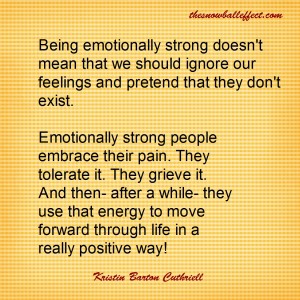 Emotionally strong people don’t cry. They don’t get their feelings hurt. They are immune to feelings of rejection. They either don’t feel emotional pain or they immediately get over it, pretending it doesn’t exist. Right?
Emotionally strong people don’t cry. They don’t get their feelings hurt. They are immune to feelings of rejection. They either don’t feel emotional pain or they immediately get over it, pretending it doesn’t exist. Right?
Guess again. To remain emotionally strong as well as physically strong, one must allow oneself to feel.
While people who are empowered, accountable, and resilient tend to be much happier than people who dwell on their pain and view themselves as a chronic victim, the “be emotionally strong and just get over it” approach can lead to future destruction.
Studies show that people who suppress their feelings, view emotion as a weakness, and do not allow themselves to grieve, do not escape their pain. Just the opposite really. When pain is swept under the rug and remains unprocessed, the feelings come back. They not only come back, but they come back with more intensity and they wear a disguise.
Below is an excerpt from the book The Snowball Effect: How to Build Positive Momentum in Your Life. Take a look at what happens when we try to be too emotionally strong and totally dismiss our feelings.
When someone has been traumatized in some way and he or she attempts to just get over it without grieving it, a whole host of physical and mental health problems may arise as a result. When trauma is swept under the rug, the emotions related to that trauma go into hiding. They don’t simply go away. When they go into hiding and are not processed, they reappear. It may be months or even years later, but they resurface in one form or another. When emotions related to an earlier trauma reappear, they often come in disguise and resurface as symptoms.
We may or may not be able to connect these symptoms to an earlier injury. These symptoms vary greatly depending on the person and the situation. They may appear as emotional triggers causing us to have an intense emotional reaction every time something reminds us of an earlier trauma. Sounds, smells, people, situations, and many other things can trigger strong emotional reactions within us. The disguise may appear as physical symptoms such as back pain, neck pain, chronic headaches, stomachaches, irritable bowel syndrome, and fibromyalgia. The unprocessed trauma can also show up as disease, anxiety, depression, and many other mental health disorders.
There are many research studies that show the benefits of discussing and processing upsetting events and emotions with another person rather than suppressing them or acting them out in an aggressive way. Norman Vincent Peale wrote in his classic book The Power of Positive Thinking, “Emotional ills turn upon yourself, sapping your energy, reducing your efficiency, causing deterioration in your health. And of course siphon off your happiness.”1 In my practice as a therapist, I have unfortunately seen this in action many, many times. Unprocessed pain, bitterness, and chronic anger have people snowballing in the wrong direction. The snowball is indeed a destructive boulder getting bigger and bigger with time.
Before trauma can heal, it needs to be processed and grieved, and there is no magical time limit for the grieving process. But if you have been full of bitterness and resentment for years, it is time to seek out support, embrace the pain behind the anger, and then let it go so that you can move forward with your life.
Here is another way to look at it. If you were to break your leg in three different places, would you be able to jump up immediately and just get over it? No! You would need to see a doctor, nurture your leg, and give it time to heal. And what if you were to dislocate your shoulder? Would you ignore it and just get over it immediately? If you did, you not only would have a disfigured shoulder that you could never use properly again, but you would always feel pain … and that just wouldn’t be wise.
No, I don’t think that you would treat an injury that way. I am guessing that you would have a physician reset your shoulder so that it could heal properly. Resetting your shoulder would temporarily intensify your pain, but that would be the price you paid to heal.
Emotional pain is no different. It must be confronted and grieved in order to heal. Like a dislocated shoulder, it might feel worse before it feels better. It is important to discuss the problem with a trusted friend, family member, or mental health professional. You will need to allow yourself time to grieve, feel the emotions associated with the injury, and nurture yourself back to better health. Finally, you need to let it go if you wish to be the best version of yourself and experience joy in life. It is healthy to grieve, but at some point you do need to let go to move forward with your life.
The following post was written by educator and psychotherapist Kristin Barton Cuthriell, author of The Snowball Effect: How to Build Positive Momentum in Your Life.





Thank you for sharing!